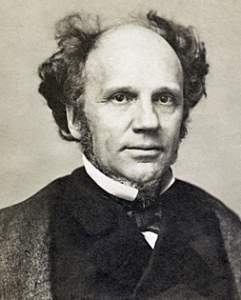Horatio Seymour (American National Bibliography)
Scholarship
[Horatio Seymour] worked behind the scenes in the late 1850s to reinvigorate and reunite the national Democratic party. Now a member of its "Soft" wing, which supported Stephen A. Douglas and popular sovereignty in the territories, Seymour fought for Douglas's election in 1860 and then joined Douglas in seeking compromise without war in 1860-1861. Once the Civil War began, however, Seymour emerged as a leader of the Democratic party's "respectable" group, who cautiously supported the northern war effort in contrast to continued resistance to military coercion by the "Peace" Democrats behind Clement Vallandigham and Fernando Wood. At the same time, fearing the power of the "violent and revolutionary" radical faction of the Republican party as the war progressed, Seymour became an outspoken and persistent critic of what Democrats believed were the extremist tendencies of the Abraham Lincoln administration. Fearing the growth of centralized power, emancipation, and war-induced limitations on press freedoms and civil liberties, Seymour was drawn into the controversies surrounding the war after he was elected governor of New York in 1862. In particular, he fought the Lincoln administration's efforts in 1863 both to suppress the "Peace" Democrats by closing their newspapers and harassing their leaders and to extend the coercive power of the national government by instituting a military draft.
Joel H. Silbey, "Seymour, Horatio," American National Biography Online, February 2000, http://www.anb.org/articles/04/04-00899.html.






